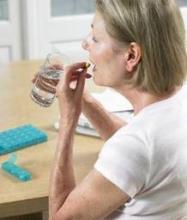NATIONAL HARBOR, MD. – Soy isoflavones are safe for postmenopausal women to take long term, having no treatment effect on endometrial thickness, reproductive hormones, or thyroid function, the results of a 3-year study have shown.
Despite previous reports that soy isoflavones have deleterious effects, they still are often used by postmenopausal women as an alternative to hormone therapy, according to study author, D. Lee Alekel, Ph.D., program director of women’s health at the National Center for Complementary and Alternative Medicine at the National Institutes of Health.
“It behooves us to examine the safety-related outcomes and rates of any adverse events in women consuming over-the-counter soy isoflavone supplements, which could be 100 mg of isoflavones a day or more,” Dr. Alekel said at the annual meeting of the North American Menopause Society. “That’s five times the intake from typical Asian diets, so it’s quite a bit more.”
The findings are from the dual-site, double-blind, placebo-controlled Soy Isoflavones for Reducing Bone Loss (SIRBL) study of women randomly assigned to placebo, or either 80 mg or 120 mg of daily soy isoflavones. No treatment effects on endometrial thickness or circulating hormone concentrations, including thyroid function, were detected using transvaginal ultrasound in any of the study groups (Menopause 2014 [doi: 10.1097/GME.0000000000000280]).
All women in the study were between 48 and 65 years of age at the time of enrollment, had experienced natural onset of menopause, did not smoke, agreed to avoid soy-based foods for the duration of the study, and maintained a healthy weight. The investigators also took into account lactation duration, and excluded from the study any women using hormone therapy or chronic medication. All participants had to have an annual physical, mammogram, gynecologic exam, and breast exam performed by their own physicians in order to remain in the study.
After losing 12% to follow-up, 224 women remained in the intent-to-treat analysis, and 208 women who were compliant with their assigned treatment fully completed the study.
Assessments done at 6, 12, 18, 24, and 36 months showed declines in median endometrial thickness in all three treatment groups: from 1.5 to 1.1 mm at the Iowa site, and from 2.6 to 1.9 mm at the California site. Neither the 80 mg nor the 120 mg dose were found to have a treatment effect (P = .57 and P = 0.43, respectively).
Adverse event rates varied by site, but not treatment arms: a higher rate of upper respiratory tract infections was noted in women studied in Iowa, compared with women enrolled at the second site in southern California (P ≤ .0001). The investigators theorized this difference was due to Iowa having longer, harsher winters. The 80-mg arm had more genitourinary issues (P = .005), primarily urinary tract infections, than did the 120-mg group.
Previous studies also have suggested soy isoflavones have no adverse effect on the endometrium, regardless of the form or dose of isoflavone; however, one study cited by Dr. Alekel “did show that 150 mg of soy taken per day for up to 5 years increased endometrial hyperplasia about 4%, but there was no endometrial carcinoma detected” (Fertil. Steril. 2004 Jul;82:145-8).
On Twitter @whitneymcknight



